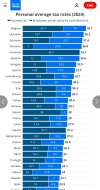Where did I say or even imply that?So you prefer the media impression that everyone is in dire poverty in this country?
And even if there's a cost of living "crisis" that doesn't necessarily mean dire poverty. Living beyond one's means is one way to create a cost of living crisis.
I presume that the CSO or other respected body has relevant statistics but since I'm not the one making claims one way or another I'm not going to spend my time researching this. But if someone from from the likes of IBEC is going to make public claims about this then I would expect them to use more than guesswork and speculation for their pronouncements.When we don't have statistics, we have to guess.
Last edited:

